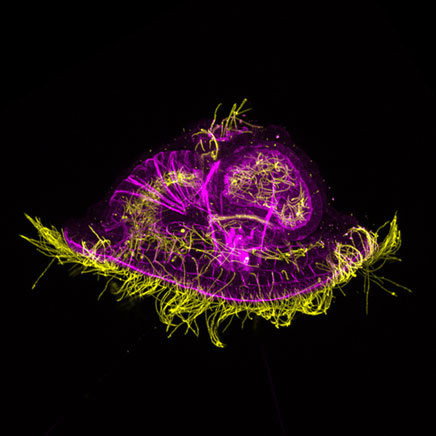Seminarios de investigación 2022
En esta página encontrarás información sobre los seminarios de investigación organizados por el MNCN en colaboración con la Sociedad de Amigos del Museo (SAM).
Diciembre
Impactos de la contaminación lumínica en aves
Ponente: Airam Rodríguez, Universidad Autónoma de Madrid
Fecha y hora: viernes 16 de diciembre de 12:00 a 13:00
Lugar: salón de actos del MNCN
Abstract: la mayoría de los seres vivos ha evolucionado bajo un régimen predecible de luz y oscuridad (ciclos de día y noche). Así, no es de extrañar que muchos procesos biológicos se desencadenen por variaciones en la luz ambiental. Sin embargo, el uso de la iluminación por parte del hombre está llevando a la transformación del paisaje nocturno por el incremento de niveles de luz artificial en los hábitats de la Tierra (contaminación lumínica). Esta contaminación lumínica puede enmascarar las señales usadas por los seres vivos para regular sus ciclos biológicos. En este seminario hablaré sobre los impactos de la contaminación lumínica en aves. Algunas de las consecuencias ecológicas de la contaminación lumínica parecen positivas desde el punto de vista de las aves mientras otras son tan negativas que causan eventos de mortalidad masiva. Para ilustrar la presentación, me centraré en algunos estudios realizados en Australia, Argentina y Canarias sobre pingüinos, búhos y aves marinas.
Sigue la retransmisión en streaming aquí.
Noviembre
Effects of climate change on marine macrophytes
Ponente: Rosa M. Chefaoui, Universidad Rey Juan Carlos,
Fecha y hora: viernes 25 de noviembre de 12:00 a 13:00
Lugar: salón de actos del MNCN
Short summary: Temporal analysis of warming-driven distributional changes in macrophytes
Abstract: Extreme events intensification and/or gradual warming are shifting species range limits worldwide. In the marine realm, record mean sea surface temperatures during the past decades and marine heat waves have been identified as responsible for severe impacts on ecosystems. A scenario of changes and redistributions in coastal communities is also provided by models used to estimate the future distribution of macrophytes. In this seminar, I will provide an overview of forecasts developed for the seagrasses and macroalgae of several coastal systems. I will also demonstrate our efforts to separate the impact of the various temperature factors on the persistence and extinction of macroalgae in the northern Iberian Peninsula.
Palabras clave: species distribution models, biogeography, seagrass, macroalgae, climate change, sea level rise
Sigue la retransmisión en streaming aquí.
In search of the rules of extinction
Ponente: Daniel Pincheira-Donoso, Queen’s University Belfast
Fecha y hora: viernes 11 de noviembre de 12:00 a 13:00
Lugar: salón de actos del MNCN
Short summary: Why do species go extinct? Organising the multiple causes of extinction under a few key rules.
Abstract: The extinction of species is one of the most alarming syndromes of human industrialisation. Why do species go extinct? Over the past few decades, a growing collective research effort has identified a wide diversity of factors that trigger and accelerate extinctions of biodiversity. Do these multiple factors fall within a few discernible ‘rules’ of extinction? This talk presents a range of case studies addressing this question across the world’s amphibians and reptiles.
Palabras clave: global change, extinction, amphibians, reptiles, macroecology
Sigue la retransmisión en streaming aquí.
Quantifying vertebrate defaunation and trophic cascading effects at the pantropical scale
Ponente: Ana Benítez-López, Universidad de Granada (@anabenlop)
Fecha y hora: viernes 4 de noviembre de 12:00 a 13:00
Lugar: salón de actos del MNCN
Short summary: Pantropical defaunation results in cascading effects on tropical forest regeneration and carbon stocks.
Abstract: Tropical forests are increasingly degraded by human pressures, with only 20% of the remaining area considered intact. However, this figure does not include other, more cryptic but pervasive forms of degradation, such as overhunting. In this seminar I will discuss how to quantify the impacts of hunting on mammal and bird populations, and how we can use predictive models and empirical data on abundance declines from local hunting studies to map the spatial patterns of mammal defaunation in the tropics. I will also show how, according to our projections, half of (seemingly) intact tropical forests are partially devoid of large mammals, and how forest coverage alone is not necessarily indicative of ecosystem intactness. Further, I will show how the combination of satellite-based land-cover change maps, habitat suitability models and hunting pressure models can be applied to quantify the individual and combined effects of habitat loss and hunting pressure on mammal communities. I will finish the seminar discussing how the declines in the abundance of frugivorous vertebrates may disrupt key ecological processes such as fruit removal, seed dispersal and predation, and seedling recruitment of animal-dispersed plant species, thus altering the structure and composition of tropical forests and, eventually, their carbon storage capacity.
Palabras clave: hunting, land use change, seed dispersal, plant-animal interactions, tropical forests, global change
Sigue la retransmisión en streaming aquí.
Octubre
Evidence for large microbial-mediated losses of soil carbon under anthropogenic warming
Ponente: Pablo García Palacios, Instituto de Ciencias Agrarias
(@PabloGarciaPal / https://www.garcia-palacios.com/)
Fecha y hora: viernes 28 de octubre de 12:00 a 13:00
Lugar: salón de actos del MNCN
Anthropogenic warming is expected to accelerate global soil organic carbon (SOC) losses via microbial decomposition, yet, there is still no consensus on the loss magnitude. In this Perspective, we argue that, despite the mechanistic uncertainty underlying these losses, there is confidence that a strong, positive land carbon–climate feedback can be expected. Two major lines of evidence support net global SOC losses with warming via increases in soil microbial metabolic activity: the increase in soil respiration with temperature and the accumulation of SOC in low mean annual temperature regions. Warming-induced SOC losses are
likely to be of a magnitude relevant for emission negotiations and necessitate more aggressive emission reduction targets to limit climate change to 1.5 °C by 2100. We suggest that microbial community–temperature interactions, and how they are influenced by substrate availability, are promising research areas to improve the accuracy and precision of the magnitude estimates of projected SOC losses.
Palabras clave: climate warming, soil carbon, soil microbes, microbial community–temperature interactions, soil respiration
Sigue la retransmisión en streaming aquí.
The Evolution of Bilaterian Life Cycles

Ponente: Chema Martín, Senior Lecturer in Organismal Biology, School of Biological and Behavioural Sciences, Queen Mary University of London (@Chema_MD)
Fecha y hora: viernes 14 de octubre de 12:00 a 13:00
Lugar: salón de actos del MNCN
Indirect development with an intermediate larva exists in all major animal lineages, making larvae central to most scenarios of animal evolution. Yet how larvae evolved remains disputed. Here we show that temporal shifts (i.e., heterochronies) in trunk formation underpin the diversification of larvae and bilaterian life cycles. Combining chromosome-scale genome sequencing in the slow-evolving annelid Owenia fusiformis with transcriptomic and epigenomic profiling during the life cycles of this and two other annelids, we found that trunk development is deferred to pre-metamorphic stages in the feeding larva of O. fusiformis but starts after gastrulation in the non-feeding larva with gradual metamorphosis of Capitella teleta and the direct developing embryo of Dimorphilus gyrociliatus. Accordingly, the embryos of O. fusiformis develop first into an enlarged anterior domain that forms larval tissues and the adult head. Notably, this also occurs in the so-called “head larvae” of other bilaterians, with whom O. fusiformis larva shows extensive transcriptomic similarities. Together, our findings suggest that the temporal decoupling of head and trunk formation, as maximally observed in “head larvae”, allowed larval evolution in Bilateria, thus diverging from prevailing scenarios that propose either co-option or innovation of gene regulatory programmes to explain larva and adult origins.
Key-words: Larvae, indirect development, direct development, annelids, functional genomics
https://www.youtube.com/watch?v=TYEMfdhQiqg
Julio
Understanding Limits to Adaptation to Environmental Change
Ponente: Jon Bridle (Director of the Centre for Biodiversity and Environment Research (CBER) and Professor of Evolutionary Biology, Department of Genetics, Evolution, and Environment, University College London)
Fecha y hora: viernes 8 de julio
Lugar: salón de actos del MNCN
https://www.youtube.com/watch?v=gNG-8jQ6MvQ
Junio
The role of local communities in effective and equitable conservation
Ponente: Karen Mustin (Universidad Federal do Amapá, Brasil)
Fecha y hora: viernes 16 de junio
Lugar: salón de actos del MNCN
https://www.youtube.com/watch?v=YCIQoXSV4Bg
Marzo
Food-web structure across environmental and biogeographic gradients
Ponente: Miguel Matías (MNCN-CSIC)
Fecha y hora: viernes 25 de marzo
Lugar: salón de actos del MNCN
https://www.youtube.com/watch?v=YCIQoXSV4Bg
Genomics for understanding ecological and evolutionary patterns in marine invertebrates
Ponente: Ana Riesgo Gil (MNCN-CSIC)
Fecha y hora: viernes 18 de marzo
Lugar: salón de actos del MNCN
https://www.youtube.com/watch?v=soUkfQwU9_E
Towards a future without disease
Ponente: María A. Blasco (Director of the Spanish National Cancer Research Centre, Head of Telomeres and Telomerase Group)
Fecha y hora: viernes 11 de marzo
Lugar: salón de actos del MNCN
Fecha
- Sábado, 01 Enero 2022
- Sábado, 31 Diciembre 2022





